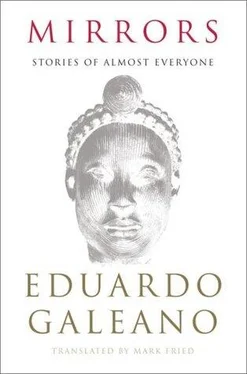Brazil, playing at home in Maracanã Stadium, was the indisputable favorite. It had just trounced Spain 6–1 and Sweden 7–1. Fate’s verdict named Uruguay as the last lamb to be sacrificed on its altar in the final. And so it was shaping up, Uruguay losing and two hundred thousand fans roaring in the stands, when Obdulio, playing with a swollen ankle, gritted his teeth. Then the captain of the strike became captain of an impossible victory.

The moribund held off their death and babies hurried up their birth.
Rio de Janeiro, July 16, 1950, Maracanã Stadium.
The night before, no one could fall asleep.
The morning after, no one wanted to wake up.

Two British teams were battling out the championship match. The final whistle was not far off and they were still tied, when one player collided with another and fell, out cold.
A stretcher carried him off and the entire medical team went to work, but the man did not come to.
Minutes passed, centuries passed, and the coach was swallowing the clock, hands and all. He had already used up his substitutions. His boys, ten against eleven, were defending as best they could, which was not much.
The coach could see defeat coming, when suddenly the team doctor ran up and cried ecstatically:
“We did it! He’s coming around!”
And in a low voice, added:
“But he doesn’t know who he is.”
The coach went over to the player, who was babbling incoherently as he tried to get to his feet, and in his ear informed him:
“You are Pelé.”
They won five-nil.
Years ago in London, I heard this lie that told the truth.

Never before had a star soccer player openly criticized the lords of the industry. But the most famous and popular athlete of all time took to the ramparts to defend players who were neither famous nor popular.
This generous and caring idol managed to score, in the space of five minutes, the two most contradictory goals in the entire history of soccer. His devoted fans venerated him for both: for the goal of the artist, embroidered by his legs’ devilish tricks, and perhaps even more for the goal of the thief, pickpocketed by his hand.
They adored Diego Armando Maradona for his prodigious acrobatics and because he was a dirty god, a sinner, the most human of the deities. Anyone could see in him a walking synthesis of human, or at least masculine, weaknesses: he was a womanizer, a glutton, a drunk, a hustler, a liar, a braggart, and utterly irresponsible.
But gods, no matter how human, do not retire.
He could never return to the anonymous crowd from whence he came.
Fame, which saved him from poverty, held him like a prisoner.
Maradona was condemned to believing he was Maradona, obliged to be the hub of every party, the baby at every christening, the deceased at every wake.
Neither urine analysis nor blood tests can detect the drug of success, but it is far more devastating than cocaine.

London, Wembley Stadium, fall of 1995.
The Colombian soccer team is challenging venerable old England in its holiest house of worship, and goalkeeper René Higuita makes an incomparable save.
His body flying horizontal, the keeper lets a deadly blast from an English striker sail past and then sends it back with his heels, flexing his legs the way a scorpion flips its tail.
It is worth looking closely at this piece of Colombian I.D. Its revelatory power resides not in the athletic prowess, but in the grin splitting Higuita’s face from ear to ear while he commits his unforgivable sacrilege.

Bertolt Brecht loved unmasking reality.
In 1953, raucous protests broke out across Communist Germany. Workers took to the streets and Soviet tanks moved quickly to shut their mouths. The official press then published a letter from Brecht in support of the ruling party. The letter, chopped up and switched around, did not say what he had written. But Brecht managed to slip past the censors with a poem spread via the underground:
After the uprising of June 17
the Secretariat of the Writers’ Union
handed out a few leaflets on Stalin Avenue
in which one could read that the people
had lost the government’s trust
and that only with great effort
could they recover it.
Would it not be easier
for the government to dissolve the people
and elect another?
A HUNDRED FLOWERS AND ONLY ONE GARDENER

In China, during Mao’s final years, anyone who dared to show what reality was and not what the Party ordered it to be committed an act of treason.
But in other times, Mao was not the person he ended up being. In his early twenties, he proposed a melding of Lao Tse and Karl Marx, and he dared to formulate it like this: “Imagination is thought, the present is the past and the future, the past and the future are the present, small is big, male is female, the many are one, and change is permanence.”
At that point, there were sixty Communists in all China.
Forty years later, the revolution took power with Mao at the helm. Women no longer had to hobble along on bound feet as commanded by appalling tradition, nor were there parks with signs warning:
CHINESE AND DOGS NOT ALLOWED.
The revolution changed the lives of one-fourth of humanity and Mao did not hide his differences with the practices bequeathed by Stalin, for whom contradictions were not proof of life or winds of history, but bothers that existed only to be crushed.
Mao said:
“Discipline that stifles creativity and initiative should be abolished.” And he said:
“Fear is no solution. The more afraid you are, the more ghosts will come to visit you.”
And he put forth the slogan:
“Let a hundred flowers bloom, let a hundred schools of thought contend.”
But the flowers did not last.
In 1957, the Great Helmsman launched the Great Leap Forward and announced that the Chinese economy would soon humble the richest economies in the world. From then on, difference and doubt were forbidden. Belief was obligatory in the lying numbers that bureaucrats churned out to keep their jobs.
Mao listened only to the echoes of his own voice telling him what he wished to hear. The Great Leap Forward leapt into the abyss.

I was in China three years after the failure of the Great Leap Forward. No one talked about it. It was a state secret.
I saw Mao paying homage to Mao. In Tiananmen Square, the Gate of Heavenly Peace, Mao presided over an immense parade led by an immense statue of Mao. The plaster Mao held his hand high, and the flesh-and-blood Mao answered the greeting. From an ocean of flowers and colored balloons, the crowd cheered both.
Mao was China and China was his shrine. Mao exhorted all to follow the example set by Lei Feng and Lei Feng exhorted all to follow the example set by Mao. Lei Feng, a young Communist apostle of dubious existence, spent his days consoling the sick, helping widows, and giving his food away to orphans. His nights he spent reading the complete works of Mao. When he slept, he dreamed of Mao, his guide for every step. Lei Feng had no girlfriend or boyfriend because he did not waste time on frivolities, and it never occurred to him that life could be contradictory or reality diverse.
Читать дальше



















